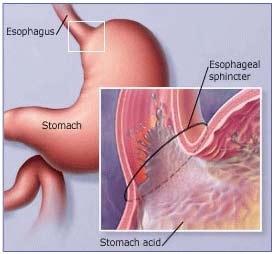

Acid Reflux Cause
While the most common acid reflux cause is poor diet, other factors can contribute. The discomfort occurs during digestion, when the stomach churns up acid or refluxes it into the esophagus, causing a burning sensation in the chest or throat. Persistent trouble may be due to various conditions, including abnormal structural or biological conditions.

The excess production of acid is not an actual acid reflux cause. The reflux is caused by failure of the valve that separates the esophagus from the stomach, the lower esophageal sphincter (LES) valve. This valve is usually closed and opens only for swallowing, so that it keeps the stomach contents out of the esophagus. Acid is the most irritating component of stomach juice and reducing the acid may reduce the irritation but it doesn’t prevent reflux; it only makes it a non-acid reflux.
The LES opens and closes the lower esophagus and maintains a pressure barrier against the stomachs contents. It is a complex area of smooth muscles and if it weakens and loses tone, the LES cannot close up completely. In such cases, acid from the stomach backs up into the esophagus. Dietary substances, drugs, and nervous system factors can weaken it and impair its function.
Obesity or wearing tight clothing can contribute to acid backing up into the esophagus because of pressure on the abdomen.
Studies have shown another common acid reflux cause - abnormal muscle or nerve function in the stomach. A study has shown that over half of all Gerd sufferers have stomach muscles that do not contract normally, increasing the risk for acid backing up.
In many cases there is a family history of GERD, most likely due to inherited muscular or structural problems in the LES or stomach. Patients with a genetic predisposition to Barrett's esophagus should be monitored if they have GERD symptoms because of the increased risk of esophageal cancer.
Another acid reflux cause is a condition called hiatal hernia. It is very common in people over 60 years of age and is rarely serious. The hiatus is a small hole in the diaphragm through which the esophagus passes into the stomach. It normally fits quite snugly, but it can weaken and enlarge allowing part of the stomach muscles to protrude into it.
Whether some cases of asthma are the cause or result of acid reflux is unclear. Studies show at least half of asthmatic patients also have GERD. There is some speculation that the coughing and sneezing from asthmatic attacks cause changes in pressure in the chest that can trigger reflux. Also, asthma drugs that dilate the airways may relax the LES and contribute to GERD.
In other cases abnormalities in the esophagus itself can create the symptoms. Adult-Ringed Esophagus is a condition characterized by an esophagus with multiple rings and persistent trouble with swallowing (including getting food stuck in the esophagus). Adult-Ringed Esophagus occurs mostly in men. Other esophageal abnormalities may come from ineffective peristalsis - the spontaneous rhythmic muscle action that moves food through the esophagus and digestive tract. If the mucous membrane is impaired, even a normal amount of acid can harm the esophagus.
Some drugs may increase the risk or severity of GERD. Nonsteroidal anti-inflammatory drugs (NSAIDs) may cause acid reflux and worsen its symptoms. In a 3-year study of 25,000 people, NSAID users were twice as likely to have GERD symptoms as non-users. Symptoms did not become evident until after about six months of regular use. NSAIDs including aspirin, ibuprofen (Motrin, Advil, Nuprin), and naproxen (Aleve) as well as many prescription drugs. Acetaminophen (Tylenol) is a good alternative for those who want to relieve mild pain.
Many other drugs be considered an acid reflux cause : calcium channel blockers (used to treat high blood pressure and angina), anticholinergics (used in drugs that treat urinary tract disorders, allergies, and glaucoma), beta adrenergic agonists (used for asthma and obstructive lung diseases), dopamine (used in Parkinson's disease), bisphosphonates (used to treat osteoporosis), sedatives, antibiotics, potassium, or iron pills.
By Mortin - Copyright 2009
Last modification 31/12/2009
Acid Reflux Cause - References


Custom Search
Acid Reflux
Heartburn
GERD
Indigestion
Tools & Resources
![]() This site complies
This site complies
with the HONcode standard for trustworthy health information:
verify here.
